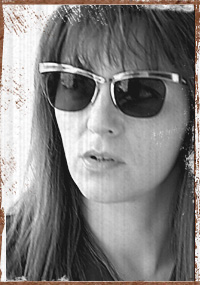
How do you feel about playing Ulrike Meinhof? Playing Ulrike Meinhof was a role that I’d always dreamed of. I’ve been fascinated by this woman for years. It’s a complete mystery to me how an earnest, intelligent woman, who had high ideals and who reached so many people through her newspaper columns and had genuine political influence, could give up her children, her career, her entire existence in order to change the world with a Kalashnikov.
How did you prepare for the role? I read everything I could get my hands on by and about Ulrike Meinhof. I talked to people who knew her, watched interviews and films about her and studied her radio and television work. And I also studied the way she talked and the way her voice changed over the years.
What is your personal opinion on Ulrike Meinhof and the RAF’s “armed struggle”? There’s something hysterical about the RAF’s self-imposed duty to change the world and fight for justice. Their conviction that their mission was imperative, their readiness to “fight until the last drop of blood” not only bordered on fanaticism, it’s also an expression of hysteria. The RAF went on a hysterical crusade against a young, still fragile democracy, which in turn reacted hysterically. The RAF’s armed struggle was something that should have happened 40 years earlier when Hitler was pushing for war. That’s when people should have revolted and called to arms. But in the 1970s, all this bloodshed and the murder of innocent people were not only cruel and gruesome, but also politically wrong.
Have you been able to solve the “Ulrike Meinhof mystery” for yourself? I still have many unanswered questions concerning Ulrike Meinhof. If she was still alive today, I would ask her how she felt about the RAF today, whether she thought that the RAF achieved anything other than killing and injuring people which lead to a tightening of the police surveillance apparatus. I would want to know how she dealt with the fact that she is responsible for the death of innocent people even though she’d been fighting against the nuclear holocaust and injustice.
What role can this film play in our understanding of the history of the RAF? In Germany this film provides the opportunity to revisit some of the stereotypes and legends that revolve around the RAF. The film offers the chance to view the history of the RAF more realistically. As a result our view of our national past might become more dangerous but it will also be more accurate.
How did you feel about filming inside Stammheim Prison? For an actor there’s always a thin line between fiction and reality. During the making of THE BAADER MEINHOF COMPLEX this line became so blurred it was sometimes undetectable. We stopped “pretending.” For the people we’re portraying it was a matter of life and death, as an actor you have to pursue that kind of attitude at least to an extent. This is why filming in Stammheim Prison took my breath away - the past felt extremely close.